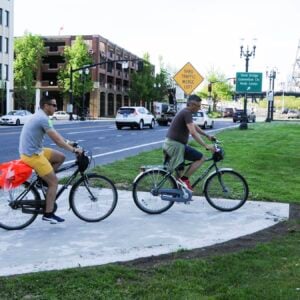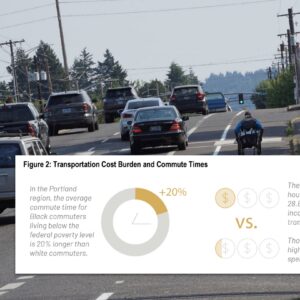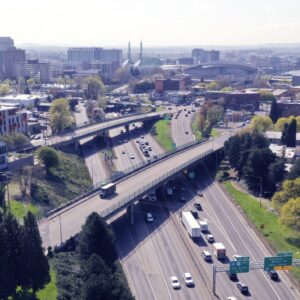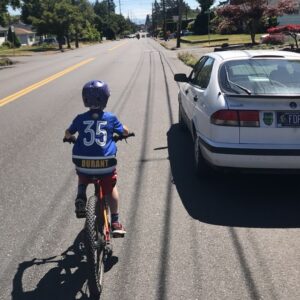Metro has been awarded a $75,000 grant from health care company Kaiser Permanente for a biking and walking map project in Cornelius, Forest Grove and Hillsboro.
The goal of the project, which Metro staffer Katie Edlin says is currently called, “Vámanos! Let’s explore Cornelius, Forest Grove and Hillsboro by bike and foot,” is to promote existing biking and walking routes to those communities. The project would also have a specific focus on connecting with Latino families.
Before creating the maps, Edlin says Metro will hold a series of public events to garner feedback and to better understand the needs of the communities. Forest Grove, Hillsboro, and Cornelius all have significant numbers of Spanish speaking residents (according to Census data, Forest Grove and Hillsboro are around 20 percent Hispanic/Latino and Cornelius is nearly 70 percent).
The maps will be printed in Spanish and English and will be available in print and on the web. If all goes according to plan, the new maps will be available for distribution by fall 2012. For more information about the project, contact Katie Edlin in Metro Regional Travel Options at Katie.Edlin[at]oregonmetro[dot]gov.








Thanks for reading.
BikePortland has served this community with independent community journalism since 2005. We rely on subscriptions from readers like you to survive. Your financial support is vital in keeping this valuable resource alive and well.
Please subscribe today to strengthen and expand our work.
I hope they plan to spell “Vámonos” correctly.
Will do. Thanks! Vámanos
And if they made a Caucasian-focused map, they’d be called racist. 🙁
The word “Latino” does not describe an ethnicity or “race”, as the word “Caucasian” does.
Latinos are white, black, and every color in between, having national origin in any of several dozen countries in North, Central and South America, and Europe. Even some Filipinos from the Asian South Pacific identify as Latino.
“Latino” is a cultural grouping primarily defined by the Spanish/Portuguese language (some even add Italian into the mix). “Latino” is not a color or race definition.
If you meet a brown-skinned native Huichól from the mountains of central Mexico who speaks only his native language, you have not met a Latino.
If you meet a rich, blue-eyed, blond-haired person from the cosmopolitan city of Buenos Aires, Argentina, you have met a Latino.
This issue is about serving an underserved, yet cohesive cultural group here in our community.
it would be more cost effective in the long run for them to spend the money teaching them to read, write, and speak english…
Why do you think that? The maps will be bi-lingual, and I can’t imagine that the printing costs would be all that much. This is a project that benefits everybody who rides the west side, AND addresses specific needs of its largest ethnic minority. Sounds pretty good to me.
Although a free, voluntary English-teaching program open to all, regardless of citizenship would be pretty awesome, too.
They’d also be called Americentric – and with good reason. Right now, every resource in this city is printed in English. Many of the city’s ethnic minorities speak and read English, but the largest component that does not speaks Spanish. Many of them ride bikes, and of those who do, at least some are riding on sidewalks, the wrong way in bike lanes, and with many behaviors generally considered dangerous to themselves and others. There is strong evidence that this is mostly due to a lack of bike education and cultural factors related to bike use in their countries of origin. This is a fantastic opportunity to reach out to those individuals and provide them with a resource that not only helps them get where they want to go, but also provide them with some tips on how to do so safely. Provided, of course that is actually gets distributed to those who need it.
I think this is awesome, I hope that the project goes well and gets some good information out to folks.
I agree with Matt on this one. Knowledge and education is never a bad thing and this can only help the community.
Well, which country is this?
Washington County. It may as well be another country, it has no bike/ped committee.
Seriously, though – why does that matter? Singapore has 4 official languages, and nearly every country in the world makes the effort to teach people English. Spanish is the 2nd most-spoken language in the United States, is it really so bad to make an effort to speak to people in their native language? (Remember, many of those Spanish speakers are US Citizens)
Nicely done, Metro! This will be an important resource for many, thank you.
Great job Metro. Thanks for the insight, Matt.
This is a really great idea. Yeah bikes!
Again, could we have a bike lane on Cesar Chavez Ave? It seems the hispanic community pushed for this. At least our politicians can feel good about themselves
that would be an awesome north/south connector, and they need something like that to calm that street…
Hear, hear!!
Great!!! We have so many bike lanes out here in Hillsboro and sometimes I feel like I’m the only one enjoying them. Let me know if you want any help with the maps, Katie.
This is awesome. Now they need to do the same for Rockwood (high Latino population) and the far Eastside. The spiffy new Gresham-Fairview trail would be included, of course…
We are planning to involve residents of Hillsboro, Forest Grove and Cornelius in the process. We will be doing focus groups with families to understand what they’d like to see in biking, walking maps. If you are interested in participating, please contact me at katie.edlin@oregonmetro.gov or 503-813-7575.
Ellen – I’d love to connect with you.
Just residents? There are a lot of cyclists who work in those communities, especially at Intel and Nike – many are bilingual, and have a lot of experience riding those roads. I’d imagine they’d be a great resource on a project like this. (not meaning to discount the residents, just pointing out that multiple perspectives are a good thing)
Katie, as an active volunteer with the WashCo BTC, Tour de Parks founder and Bike For Fun kids bike program, I would be willing to help on this project. My personal focus is child bike safety…this sounds like a great project-congratulations on the grant.
It’s helpful to have some bilingual cycling maps..at least. And basic safety info. But more importantly, is to continue to make cycling’s image as a good form of transport/fun. You want to raise it and keep it at as a viable, useful and even admirable form of transport, fitness and recreation.
It may be useful also for Portland’s established cycling events to integrate (not create a separate event), partnership events that involve the Spanish-speaking communities. The culture of cycling groups, causes many outsiders feel as if they can’t easily “penetrate” the social cycling groups. I know that the cycling advocates do not mean to be “elitist” but it’s so easy to only socialize and partner regularily with groups/other cyclists whom you already know. There is already a cycling language among different cycling interests –among the fixies, racers, advocates (well, yes, there really is), etc.
The trick is to find those who are bilingual..and already cycling, but can bridge between the 2 worlds easily.
But always remember, in the end it isn’t lack of whatever language fluency or cultural divides, but lack of cycling infrastructure that is the biggest hurdle, particularily if people wouldn’t feel safe. Bilingual cycling education/materials is just 1 piece of the big pie.